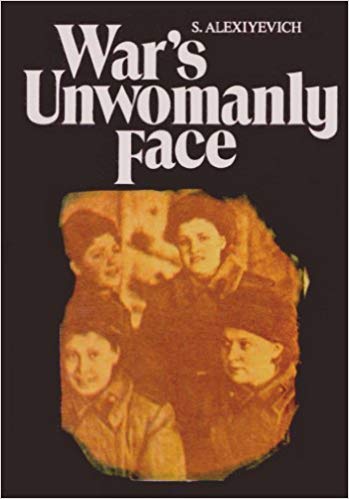
Soviet women who fought in World War II were given a voice by the Belarusian Nobel laureate Svetlana Alexievich in her non-fiction book WAR’S UNWOMANLY FACE. It was first published in English in 1988, by Progress Publishers in Moscow, in a translation by Keith Hammond & Lyudmilla Lezhneva. The original Russian text – published three years earlier – had, however, been heavily censored. Alexievich spent seven years patiently interviewing hundreds of women who had served on the front line or were part of the supporting infrastructure, weaving their stories into a remarkable, unvarnished oral history.
By the time Alexievich was awarded the Nobel Prize in 2015, the Moscow edition was out of print. The book was retranslated by the husband-and-wife team of Richard Pevear and Larissa Volokhonsky, famous for their translations of Russian classics by Tolstoy, Dostoevsky, Bulgakov and others. This new, unexpurgated version was published by Penguin in 2017 as THE UNWOMANLY FACE OF WAR: AN ORAL HISTORY OF WOMEN IN WORLD WAR II.
Important works by two other Nobel laureates also appeared in English for the first time in 1988. THE PIANO TEACHER, by the Austrian novelist and playwright Elfriede Jelinek, was translated from the German by Joachim Neugroschel (cf. #TA60 1979). It depicts a sadomasochistic relationship between a piano teacher and her student, and was the first of Jelinek’s many works to be published in English. Elfriede Jelinek has herself translated from French and English into German, mostly plays, including several Feydeau farces, Wilde’s THE IMPORTANCE OF BEING EARNEST, Marlowe’s THE JEW OF MALTA, and GRAVITY’S RAINBOW by Thomas Pynchon.
Finally for 1988, LOVE IN THE TIME OF CHOLERA by the great Colombian writer Gabriel García Márquez (cf. #TA60 1970) describes a romantic love that lasts a lifetime, reuniting the lovers in their old age. It was translated from the Spanish by Edith Grossman.
The Unwomanly Face of War
https://www.penguin.co.uk/books/295/295606/the-unwomanly-face-of-war/9780141983530.html
The Piano Teacher
https://serpentstail.com/the-piano-teacher.html
Love in the Time of Cholera
https://www.penguin.co.uk/books/55503/love-in-the-time-of-cholera/9780141189208.html
